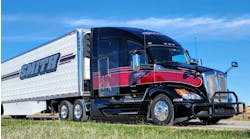Vehicle Miles Traveled (VMT) taxes have proven costly to administer, enforce, and comply with, and the trucking industry will strongly oppose implementing a VMT tax, American Trucking Associations (ATA) Vice-President Bob Pitcher said at the Symposium on Mileage-Based User Fees in Minneapolis MN.
Speaking on the Political Leadership and Project Champions panel, Pitcher said the industry regards a VMT tax as a weight-distance tax (WDT). More than 20 states have already repealed WDTs as outdated and ineffective. All but four states currently rely on a combination of truck registration fees and fuel taxes as the most efficient, cost-effective way to raise money to build and repair roads.
“Imagine the bureaucracy needed to oversee and collect VMT fees from millions of highway users,” Pitcher said. Even when a system is in place to supervise collection of taxes, the VMT concept has proven vulnerable to evasion. That could ruin any financial benefits of the tax.
“Keeping track of a gallon of fuel—a valuable, tangible product—is far easier than keeping track of a mile traveled,” he said.
The federal fuel tax collected at the pump—18.4 cents per gallon of gasoline and 24.4 cents per gallon of diesel—has long been the most equitable, low-cost method of funding highway infrastructure.
Hybrid and electric technology continues to grow in the passenger vehicle market and lessen the demand for gasoline. Finding an alternative to the federal tax on gasoline is a far more urgent need than finding an alternative to the fuel tax on diesel. Currently there is no readily available alternative to diesel fuel for over-the-road trucks, so diesel consumption remains relatively stable.
Until alternatives exist, the traditional system of highway funding through registration fees and fuel taxes remains the most efficient way to fund critical highway projects, including major highway bottlenecks, that will help to reduce traffic congestion and reduce carbon emissions.


